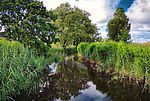If the Research News is not displayed correctly, please click here for the web edition.
Issue 21 / December 2023

ISOE – Institute for Social-Ecological Research in Frankfurt am Main is one of the leading independent institutes for sustainability research. It develops scientific foundations and future-oriented concepts for social-ecological transformations. To this end, ISOE conducts transdisciplinary research on global problems such as water scarcity, climate change, biodiversity loss and land degradation and finds viable solutions that take ecological, social, and economic conditions into account.

Contents
“Insectopolis”: ISOE awards art scholarship on the topic of insect diversity in the city +++ Threatened insect diversity in nature reserves – recommendations from the DINA research project +++ ISOE Lecture with Lisen Schultz at the Goethe University Frankfurt: Social ecology for decision-makers +++ Transdisciplinary research – Added value for science +++ What is the state of municipal climate adaptation in Germany? +++ How the use of chemicals and biodiversity loss are connected +++ Publications
“Insectopolis”ISOE – Institute for Social-Ecological Research awards art scholarship on the topic of insect diversity in the city | ||
 | In order to halt the trend of global insect decline, insects must regain habitats, both in agricultural landscapes and in cities. This requires people to appreciate insects and their ecosystem services and be willing to contribute to insect conservation. To this end, the SLInBio research project, led by ISOE – Institute for Social-Ecological Research, is developing interventions where citizens can...Read more | |
Biodiversity researchThreatened insect diversity in nature reserves – recommendations from the DINA research project | ||
 | The decline in insect populations has been documented for decades. In German nature reserves, too, insects are generally becoming fewer and a notably receding biodiversity can be observed. The research team of the “DINA” project has investigated the underlying reasons and has been looking out for possible solutions to protect insects. In a recent publication in the journal “Environmental Sciences...Read more | |
ISOE Lecture with Lisen Schultz at the Goethe University FrankfurtSocial ecology for decision-makers | ||
![[Translate to English:] [Translate to English:]](fileadmin/_processed_/1/7/csm_AdobeStock_555013459_juan_web_bb307fb4e5.jpg) | The earth is reaching its limits: In the Anthropocene, humans have changed the ecological foundations of life to such a fundamental extent that the planetary limits of several earth systems have been reached. The symptoms such as global warming, species extinction, and water scarcity are well known, but looking at the way we deal with the foundations of life we can see that a necessary trend...Read more | |
Transdisciplinary researchAdded value for science | ||
 | Transdisciplinary research aims to make a contribution to the understanding and promotion of social change. These societal effects account for the popularity of the research mode that involves different scientific disciplines as well as non-scientific actors. But how does the transdisciplinary research mode actually affect science? Lena Theiler and Oskar Marg from ISOE – Institute for...Read more | |
New research project KomKlAnWhat is the state of municipal climate adaptation in Germany? | ||
 | Heat, drought and heavy rain: The consequences of climate change have long been clearly noticeable. Cities and municipalities are particularly affected, since flooding or heat islands within cities represent a danger for residents as well as municipal infrastructures. However, municipalities are facing numerous challenges when it comes to planning and implementing concrete measures for climate...Read more | |
Research network RobustNatureHow the use of chemicals and biodiversity loss are connected | ||
 | Science does not take a deep enough look at chemicals in the environment as one of the causes of the decline in biodiversity. Forty scientists in the RobustNature research network of Goethe University Frankfurt and collaborating institutes, which also includes ISOE – Institute for Social-Ecological Research, have corroborated this in a study that has now been published in the journal “Nature...Read more | |
Publications
Blaum, Niels/Dirk Lohmann/Stefan Liehr/Deike U. Lüdtke/Markus Rauchecker/Ben Mapani/Morgan Hauptfleisch/Martin Hipondoka/Isaac Mapaure/Kenneth Uiseb (2023): Science-led perspectives to guide wildlife-based strategies of land use. Insights from a German-Namibian research cooperation. Factsheet, 15. Frankfurt am Main et al.: ORYCS Project Consortium
Brinkmann, Katja/Diego A. Menestrey Schwieger/Lena Grieger/Sara Heshmati/Markus Rauchecker (2023): How and why do rangeland changes and their underlying drivers differ across Namibia's two major land-tenure systems? The Rangeland Journal 45 (3), 123-139
Frick-Trzebitzky, Fanny/Rossella Alba/Kristiane Fehrs (2023): Adaptive governance as bricolage. Geographica Helvetica 78 (3), 397-409
Hoefling, Christina/Eva Rossmanith/Lena Theiler/Simone Kimpeler (2023): How do we want to live? Collaborative curation of a special exhibition on sustainable futures at the Senckenberg Natural History Museum Frankfurt. In: Wood, Elizabeth (Hg.): A New Role for Museum Educators. Purpose, Approach, and Mindset. Abingdon, New York: Routledge, 210-220
Hoffmann, Sabine/Lisa Deutsch/Benjamin Hofmann/Hanna Salomon/Christian Pohl/Alexandra Lux/Emilia Nagy/Silke Kleihauer/Sebastian Rogga/Jana Zscheischler (2023): Towards a theory of change to institutionalise integration experts and expertise. Blog Integration and Implementation Insights
Irob, Katja/Britta Tietjen/Taylor Smith/Deike U. Lüdtke/Markus Rauchecker/Morgan Hauptfleisch (2023): Savanna response to management strategies. A simulation model approach with climatic extremes. Factsheet, 6. Frankfurt am Main et al.: ORYCS Project Consortium
Köthe, Sebastian/Nikita Bakanov/Carsten A. Brühl/Lisa Eichler/Thomas Fickel/Birgit Gemeinholzer/Thomas Hörren/Aleksandra Jurewicz/Alexandra Lux/Gotthard Meinel/Roland Mühlethaler/Livia Schäffler/Christoph Scherber/Florian D. Schneider/Martin Sorg/Stephanie J. Swenson/Wiltrud Terlau/Angela Turck/Gerlind U.C. Lehmann (2023): Recommendations for effective insect conservation in nature protected areas based on a transdisciplinary project in Germany. Environmental Sciences Europe 35 (102 (2023))
Kraus, Ronja/Stefan Liehr/Robert Lütkemeier/Morgan Hauptfleisch/Ivonne Makando/Nichola M. Knox (2023): Cumulative impact of fences and land use on elephant movement. Factsheet, 12. Frankfurt am Main et al.: ORYCS Project Consortium
Lüdtke, Deike U./Manjana Tausendfreund/Stefan Liehr (2023): Farmers' perception of wildlife. How do farmers feel about certain wildlife species? Factsheet, 13. Frankfurt am Main et al.: ORYCS Project Consortium
Marg, Oskar/Lena Theiler (2023): Effects of transdisciplinary research on scientific knowledge and reflexivity. Research Evaluation , rvad033
Prakash, Sreya/Stefan Liehr/Marc Beckett/Marius Mohr (2023): Decentralizing for the Future. Water Innovation Hub Coimbatore - HubPost, 6. Coimbatore, Frankfurt am Main, Stuttgart
Rauchecker, Markus/Alice Cimenti/Stefan Liehr (2023): How to bring knowledge and policies to farmers. Factsheet, 14. Frankfurt am Main et al.: ORYCS Project Consortium
Schneider, Flurina/Zarina Patel/Katsia Paulavets/Tobias Buser/Jacqueline Kado/Stefanie Burkhart (2023): Fostering transdisciplinary research for sustainability in the Global South: Pathways to impact for funding programmes. Humanities and Social Sciences Communications 10 (620 (2023))
Sylvester, Francisco/Fabian G. Weichert/Verónica L. Lozano/Ksenia J. Groh/Miklos Bálint/Lisa Baumann/Claus Bässler/Werner Brack/Barbara Brandl/Joachim Curtius/Paul Dierkes/Petra Döll/Ingo Ebersberger/Sotirios Fragkostefanakis/Eric J.N. Helfrich/Thomas Hickler/Sarah Johann/Jonas Jourdan/Sven Klimpel/Helge Kminek/Florencia Liquin/Darrel Möllendorf/Thomas Mueller/Jörg Oehlmann/Richard Ottermanns/Steffen U. Pauls/Meike Piepenbring/Jakob Pfefferle/Gerrit Jasper Schenk/Scheepens J.F.Niek/Martin Scheringer/Sabrina Schiwy/Antje Schlottmann/Flurina Schneider/Lisa M. Schulte/Maria Schulze-Sylvester/Ernst Stelzer/Frederic Strobl/Andrea Sundermann/Klement Tockner/Tobias Tröger/Andreas Vilcinskas/Carolin Völker/Ricarda Winkelmann/Henner Hollert (2023): Better integration of chemical pollution research will further our understanding of biodiversity loss. nature ecology & evolution 7, 1552-1555
Völker, Carolin/Thomas Friedrich/Matthias Winfried Kleespies/Oskar Marg/Sabrina Schiwy (2023): "The toxic substance has killed all ducks": framing of chemical risks related to the 2021 summer flood in German news media. Environmental Sciences Europe 35 (83)
Weiser, Annika/Matthias Wanner/Franziska Stelzer/Daniel J. Lang/Hilke Berger/Agnes Förster/Christa Liedtke/Hans-Wolfgang Micklitz/Jörg Niewöhner/Oliver Parodi/Thomas Potthast/Flurina Schneider/Franziska Sörgel/Michael Ziehl/Gesa Ziemer (2023): Exploring fruitful links between real-world laboratory and disciplinary research. Introduction of the DKN Future Earth working group LinkLab. GAIA 32 (3), 335-337
Further publications can be found at www.isoe-publikationen.de.
To edit your Research News profile, please click here.
Free electronic Research News of ISOE – Institute for Social-Ecological Research.
Editorial:
Dr. Nicola Schuldt-Baumgart (ViSdP)
E-Mail: schuldt-baumgart@isoe.de
Melanie Neugart, Harry Kleespies
Publisher:
ISOE – Institute for Social-Ecological Research
Hamburger Allee 45, 60486 Frankfurt am Main, Germany
Tel. +49 (0)69 707 69 19-0
Fax +49 (0)69 707 69 19-11
info@isoe.de
www.isoe.de/en
Follow us: twitter.com/isoewikom | facebook.com/ISOE.Forschungsinstitut | instagram.com/isoe_institut
ISOE-Blog: https://isoe.blog